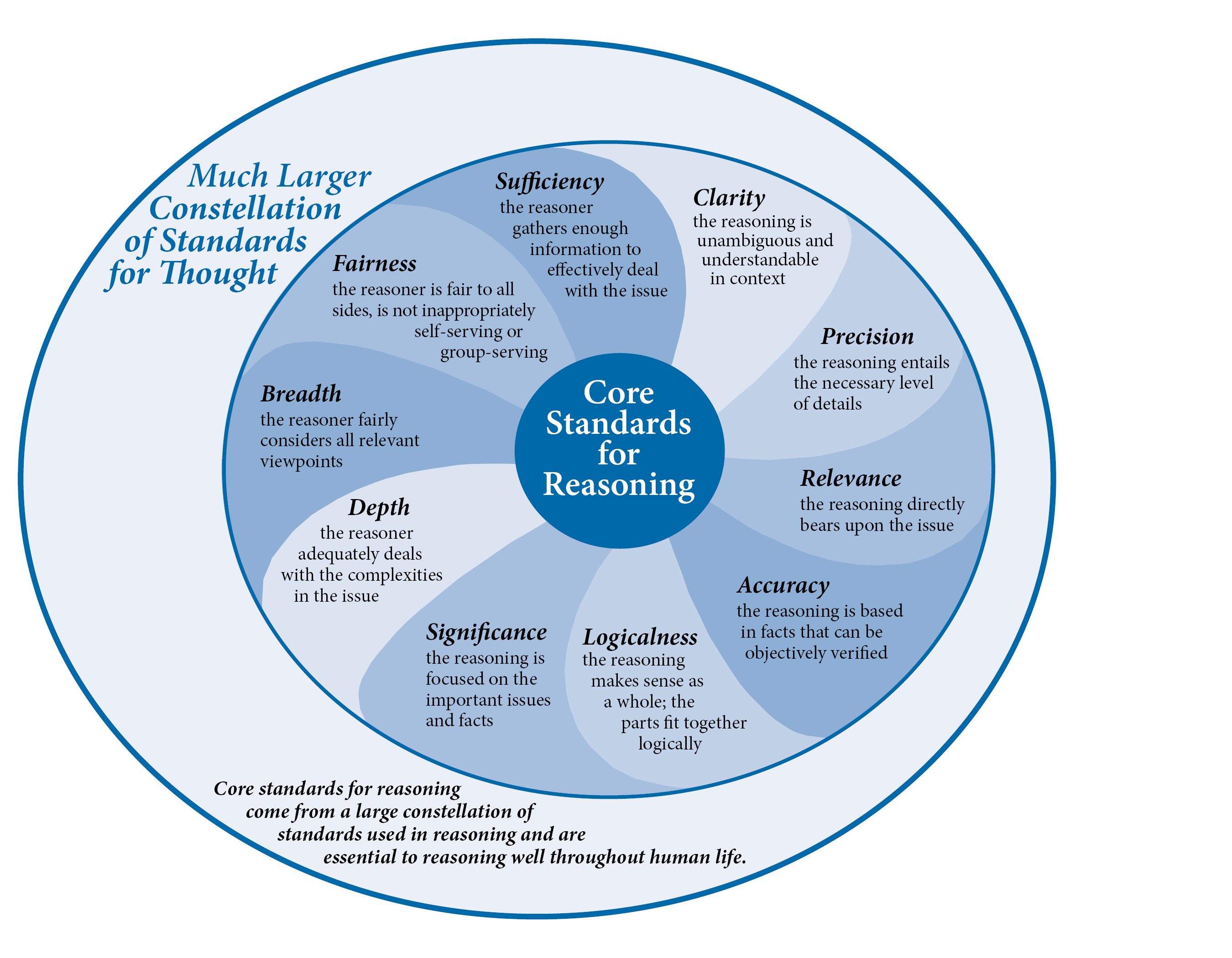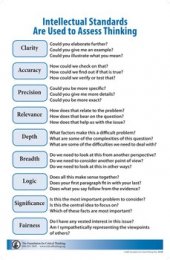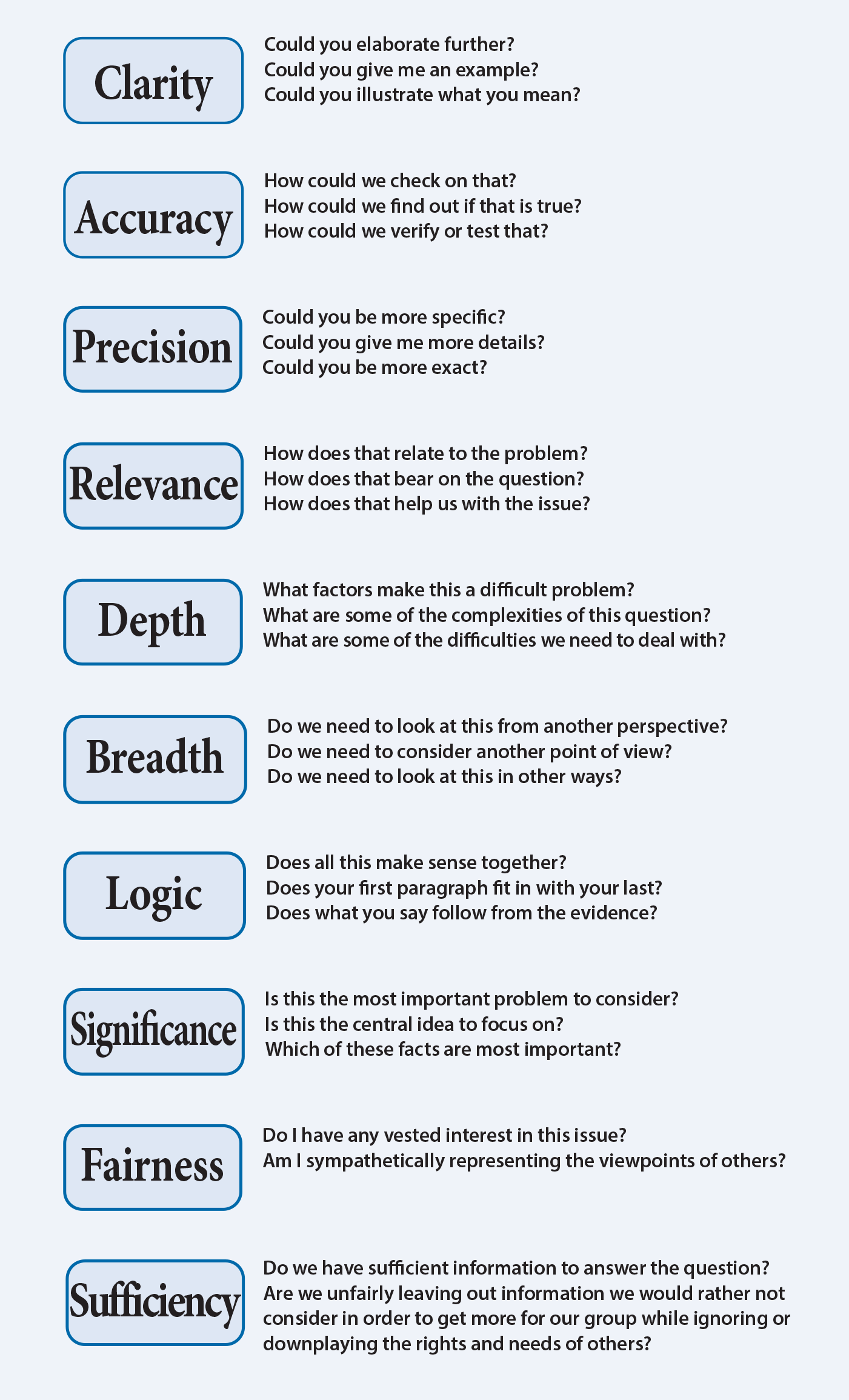
Criteria Corner
Humans live in a world of thoughts. We accept some thoughts as true. We reject others as false.
But the thoughts we perceive as true are sometimes false, unsound, or misleading.
The mind doesn’t naturally grasp the truth. We don’t naturally see things as they are. We
don’t automatically sense what is reasonable and what unreasonable. Our thought is often
biased by our agendas, interests, and values. We typically see things as we want to. We twist
reality to fit our preconceived ideas. Distorting reality is common in human life. It is a
phenomenon to which we all unfortunately fall prey.
Each of us views the world through multiple lenses, often shifting them to fit our changing feelings. In addition, much of our perspective is unconscious and uncritical and has been influenced by many forces – including social, political, economic, biological, psychological, and religious influences. Social rules and taboos, religious and political ideologies, biological and psychological impulses, all play a role, often unconscious, in human thinking. Selfishness, vested interest and parochialism, are deeply influential in the intellectual and emotional lives of most people.
Each of us views the world through multiple lenses, often shifting them to fit our changing feelings. In addition, much of our perspective is unconscious and uncritical and has been influenced by many forces – including social, political, economic, biological, psychological, and religious influences. Social rules and taboos, religious and political ideologies, biological and psychological impulses, all play a role, often unconscious, in human thinking. Selfishness, vested interest and parochialism, are deeply influential in the intellectual and emotional lives of most people.
We need a system for intervening in our thoughts. We need to take rational command of our cognitive
processes in order to rationally determine what to accept and what to reject. In short, we need standards for
thought, standards that guide us to consistently excellent thinking – standards we can count on to
keep our thinking on track, to help us mirror in our minds what is happening in reality, to reveal the truth in
situations, to enable us to determine how best to live our lives.
We postulate that there are at least nine intellectual standards important to conducting affairs of everyday
life. These are clarity, precision, accuracy, relevance, depth, breadth, logicalness, significance, and fairness.
Beginning with these nine intellectual standards will help set the stage for conceptualizing intellectual standards (more broadly) and for appreciating the essential role of intellectual standards in human reasoning.
Beginning with these nine intellectual standards will help set the stage for conceptualizing intellectual standards (more broadly) and for appreciating the essential role of intellectual standards in human reasoning.

In this section we offer activities to help you develop your ability to use intellectual
standards in everyday thought. Activities in this section are personal and therefore do not
contain specimen answers. Most of these activities were taken, and slightly modified,
from the book:
Critical Thinking: Tools for Taking Charge of Your Professional and
Personal Life by Richard Paul and Linda Elder (2014, published by Rowman & Littlefield).
For a deeper understanding of intellectual standards, read
The Thinker’s Guide to Intellectual Standards.
Video Series
Intellectual Standards
This video collection explores universal intellectual standards. Intellectual standards are standards which must be applied to thinking whenever you need to check the quality of reasoning about a problem, issue, or situation. To think critically entails having command of these standards. To help learn them, you should pose questions which probe thinking; questions which hold you and others accountable for the thinking being done; questions which, through consistent use become internalized as questions you routinely ask in order to check and improve thinking. The ultimate goal, then, is for these questions to become infused in your thinking, forming part of your inner voice, which then guides you to better and better reasoning.
View Videos in the Series
This video collection explores universal intellectual standards. Intellectual standards are standards which must be applied to thinking whenever you need to check the quality of reasoning about a problem, issue, or situation. To think critically entails having command of these standards. To help learn them, you should pose questions which probe thinking; questions which hold you and others accountable for the thinking being done; questions which, through consistent use become internalized as questions you routinely ask in order to check and improve thinking. The ultimate goal, then, is for these questions to become infused in your thinking, forming part of your inner voice, which then guides you to better and better reasoning.
View Videos in the Series
Before beginning the activities, familiarize yourself with these nine essential intellectual standards and begin using them in your
daily life to improve your thinking immediately. Use the intellectual standards questions in meetings, in discussions, when
preparing reports, and in every part of life where they are relevant.
Top ▲

